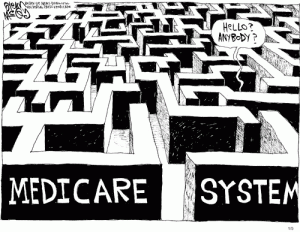By Steve Moran
Ever since President Biden announced his plans to reform the nursing home industry, a steady drumbeat has been coming out of the industry. The theme: “Don’t Blame the Nursing Homes.”
The most recent is a guest op-ed penned by Dr. David Gifford, a geriatrician and chief medical officer at the American Health Care Association and the National Center for Assisted Living. It is titled, “Don’t Blame Nursing Homes for the Deaths of Residents in a Pandemic.”
A System Failure
Hardly any nursing home had zero COVID deaths, but some did better than others. And there were some very public stories of huge failures. Why those deaths happened is obviously complicated and multifaceted and includes failures by regulators, politicians, and hospitals — and yes some, but not all, nursing homes.
Fundamentally, the deaths happened because the whole “nursing home” system is horrifically flawed, meaning that the great tragedy that took place was a systems failure. The solution is not simply more regulations, as the government is proposing, or more money, as the industry is proposing, but rather a complete revamping of the system.
Something no one seems willing to take on as a serious initiative.
“Don’t Blame Us,” As a Message
I confess that I am having a hard time seeing a “don’t blame us” narrative as one that will win the hearts and minds of anyone who is outside the nursing home/senior living industry. There are at least three reasons for this:
- From first grade through high school, every kid who was accused of some kind of mischief or misdeed starts with these words: “Don’t blame me, it is not my fault.” And pretty much every time, they deserved the blame.
- Every criminal ever caught doing anything says … “Don’t blame me, it is not my fault.” Yet most of the time, they did it and deserved all the blame they got.
- There are simply too many legitimate stories about inadequate care. Google the term “nursing home abuse,” and you get almost a billion-and-a-half results. Narrow it to just news stories, and there are more than a million news stories that talk about nursing home abuse.
The Distrust Problem
The biggest problem with “don’t blame us” is that it makes the public and politicians have more distrust of nursing homes, not less. Nursing homes’ value proposition is that they are the best place for frail older people to go live out their lives with dignity, purpose, and compassion. In effect, what the industry is saying is that they have failed to do that, but it is not their fault.
It is unlikely that it will get many takers.
A Better Way
I have suggested in many articles that Brookdale put me on their board. Still waiting on that invitation, but the offer still stands ….
I have a new suggestion: that the American Health Care Association and the National Center for Assisted Living hire me to help them create a winning messaging strategy. … Well, okay, they don’t need to. I am going to offer it up for free.
- Acknowledge that the industry was part of the problem. This is an obvious truth. Not every operator for sure, but the industry could have done better, or at least certain operators could have done better.
- Propose a complete overhaul of the entire nursing home post-acute system. This would mean standing up to pressure from nursing home operators that would fail under this overhaul, vendors that would cease to have a reason to exist, and regulators who would have to approach what they do very differently.
- The industry should be telling stories about real people whose lives have been made better by the industry — residents who died with dignity, families that were healed, and team members who grew entire careers. Real people, real stories.
If this were to happen, nursing homes would get the respect they deserve. More importantly, older people and their families would have profound, powerful last-chapter experiences. Society would be better off, and it would save the government hundreds of millions of dollars a year.








